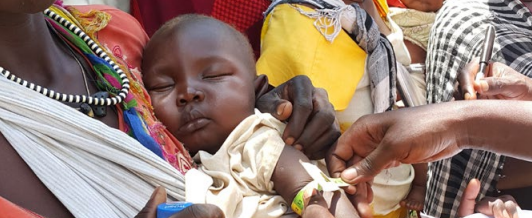Thousands of people in the Baggari area in Wau County have fled into the bush, homes have been burnt, and health clinics in the area have vandalized and abandoned by health workers, according to a recent humanitarian assessment.
Violence in the rural area near Western Bahr al Ghazal State’s capital Wau has worsened since the signing of a peace agreement last year, after army troops from neighboring states were sent to the area in December. Ceasefire monitors in March cited reports that soldiers burnt homes and engaged in “acts of hostility” toward the civilian population, while also saying that that government forces in the area likely had also been subjected to attacks and provocation.
On Monday, the UN Office for Coordination of Humanitarian Affairs (OCHA) reported that a humanitarian assessment team visited the Baggari area on 20 May. They estimated that about 21,400 people were displaced after fighting in February 2016, including in Ngo Halima, Tadu, Ngisa, Farajalla, Natabu, Bringi, Baggari center, Ugali, Ngodakala and Ngo Sulugu.
“Health facilities had been vandalized and there were no health workers on the ground during the assessment. The assessment found that people are living deep in the bush because of fears of further attacks. There were reports of sexual and gender-based violence and killing of civilians, including children,” reads a bulletin released by the UN agency.
OCHA further reported that people have been left without adequate food and shelter after their homes were attacked.
“Homes in the assessed areas had been burnt and people reported that their food stocks and household items had been looted. People said they were surviving by eating wild roots – which they have to soak in water for three days then dry and cook before eating – and picking cassava leaves and roots.”
Displaced people are sleeping in the open and lack food, shelter, basic household items, health services and nutritional support. “Meanwhile, insecurity remains a concern for displaced people in and around Wau town,” OCHA noted.
Skirmishes have continued in the Wau area in May, including reportedly in Bussere and Moimoi, Bazia payam, close to Wau town on 10 May, and from 15 to 17 May in Menemba A Boma.
Several thousand people have fled into Raja County since February.
Aid workers are also working to assist people in and around Wau town. In May, food assistance targeting about 70,000 people was distributed and a verification exercise was conducted, after which people received ration cards.
In the Greater Baggari area itself, the amount of assistance delivered is reported to be minimal, though during the assesment mission aid workers distributed high-energy biscuits to about 2,000 children and pregnant and lactating mothers and plumpy nuts to 22 children with severe acute malnutrition.
Photo: Malnutrition screening in Baggari area, 20 May 2016 (OCHA)




